|
Koehler Hall Dedicated
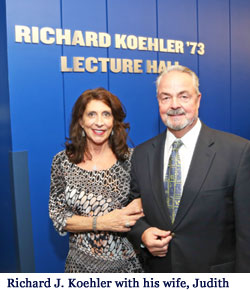 “To me, John Jay is the gift that keeps on giving.” With those words, Richard J. Koehler (BA ’73, JD) acknowledged the dedication and naming of Richard J. Koehler ‘73 Hall in the New Building. Koehler is a former recipient of the John Jay Distinguished Alumnus Award and a trustee of the John Jay College Foundation. Click here for photos of the dedication ceremony. “To me, John Jay is the gift that keeps on giving.” With those words, Richard J. Koehler (BA ’73, JD) acknowledged the dedication and naming of Richard J. Koehler ‘73 Hall in the New Building. Koehler is a former recipient of the John Jay Distinguished Alumnus Award and a trustee of the John Jay College Foundation. Click here for photos of the dedication ceremony.
To learn more, visit www.jjay.cuny.edu/911memorial.
_______________________________________________________________________________
9/11 Memorial Unveiled
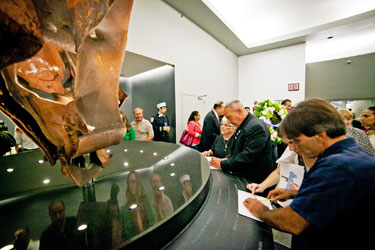
In a somber observance during which speaker after speaker emphasized themes of sacrifice, heroism and commitment, John Jay College on September 10 dedicated a monument to the 67 members of the college community who died in the 2001 terrorist attack on the World Trade Center.
The ceremony included spoken and musical tributes, police honor guards and a wreath-laying. A group of eight people – led by John Jay Foundation Board of Trustees Chairman Jules Kroll and including students, faculty members, alumni and 9/11 family members — read the names of the victims, whose faces appeared on a giant screen above the stage in the Gerald W. Lynch Theater.
In his welcoming remarks, President Jeremy Travis hailed those who gave their lives, saying, “The Twin Towers stood tall, as did members of this community.” Acknowledging the family members of “our heroes” who were in attendance, President Travis continued: “Their presence reminds us of the loss we have suffered as a community. They are always members of the John Jay family.”
Reflections were provided by New York City Fire Commissioner Salvatore Cassano and NYPD Chief of Department Philip Banks 3rd, each of whom addressed the theme of honoring the past while looking to the future. “This memorial is about students coming here from all over the world to study with the best,” said Cassano. “It is an extension of the commitment this school stands for.” Banks, the NYPD’s top uniformed official, said of the 67 John Jay heroes: “We have a duty beyond honoring them, namely finding a common purpose in society.
“A single beam can never support a building,” said Banks. “The same is true with the John Jay College community. If we band together, we will prevail.”
Provost Jane Bowers acknowledged those who have donated scholarships in honor of the John Jay heroes, along with the students who have received them. “You are our future,” said Bowers, “collectively, a perfect tribute to the heroes of 9/11.”
The 9/11 Memorial Sculpture was created from one of the fire-scarred steel beams salvaged from the wreckage of the Twin Towers. The beam is mounted on a granite pedestal bearing the 67 names along with the inscription, “Dedicated in Memory of Those from the John Jay College Community Who Lost Their Lives on September 11, 2001.”
Designed by the architectural firm of Skidmore, Owings & Merrill, the sculpture stands in a specially prepared nook in the newly renamed Memorial Hall, the heavily traveled space that connects Haaren Hall and John Jay’s new building.
At the wreath laying that followed, President Travis called the monument “a reminder of our sacred responsibility to educate generations to come.”
One of the family members who attended the ceremony, New York City Police Officer Sherrod Stuart, is a John Jay senior majoring in Criminal Justice. His uncle, Walwyn Stuart, was a Port Authority police officer who was killed in the Trade Center. The young police officer said the memorial is particularly meaningful to him as a John Jay student. “When I come to school and see this, I think about how it will inspire future generations.”
To learn more, visit www.jjay.cuny.edu/911memorial.
_______________________________________________________________________________
‘Creative Researcher, Passionate Advocate’
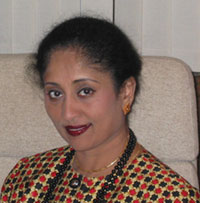 Professor Mangai Natarajan (right) in the Department of Criminal Justice was the recipient of the Excellence in Policing Award sponsored by the Australasian Council of Women and Policing. She received the award at the 15th Annual Excellence in Policing Awards presentation dinner held as part of the 8 Australasian Women and Policing conference Making it Happen: Making it Last in Adelaide, Australia, on August 27. Professor Mangai Natarajan (right) in the Department of Criminal Justice was the recipient of the Excellence in Policing Award sponsored by the Australasian Council of Women and Policing. She received the award at the 15th Annual Excellence in Policing Awards presentation dinner held as part of the 8 Australasian Women and Policing conference Making it Happen: Making it Last in Adelaide, Australia, on August 27.
“Receiving this award was a great honor for me as a woman and a scholar who strives to improve the status of women in policing and women in developing economies, especially India,” said Natarajan.
The Australasian Council of Women and Policing is a world renowned association for women police. It aims to improve policing for women by making police organizations more appealing, recognizing employers of women, and ensuring that policing services that they provide meet the needs of women in the community.
According to the ACWAP, the award recognizes Natarajan’s 25 years of research on women in policing and the resultant peer-reviewed publications.
“Professor Natarajan has been a creative researcher and a passionate advocate for women in policing. Her work is path breaking and practical, and widely acclaimed. She is at the peak of her creative capacity, and her legacy in this field will be enduring,” said the ACWAP.
Natarajan originally became interested in this work while conducting research for her doctorate from Rutgers University in 1991 in which she compared the work and ambitions of women officers in India and the United States. She compiled the findings of her many studies in a book titled Women Police in a Changing Society: Back Door to Equality (Ashgate Publishing, 2008). This is the first book to offer a detailed empirical account of the development of women police in a non-Western culture.
_______________________________________________________________________________
Doctoral Research Gets a Boost
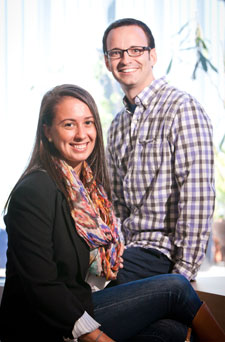 Jeff Kukucka and Amanda Nicholson (left), both students in the John Jay/CUNY PhD program in Psychology and Law, are the recipients of prestigious National Science Foundation Dissertation Improvement Grants. Nicholson will examine "The Impact of Jury Diversity on Deliberation Quality" with her faculty mentor, Professor Margaret Kovera in the Department of Psychology, while Kukucka will complete his study titled, "An Investigation of Factors that Create and Mitigate Confirmation Bias in Judgments of Forensic Evidence," with his advisor, Distinguished Professor of Psychology Saul Kassin. Jeff Kukucka and Amanda Nicholson (left), both students in the John Jay/CUNY PhD program in Psychology and Law, are the recipients of prestigious National Science Foundation Dissertation Improvement Grants. Nicholson will examine "The Impact of Jury Diversity on Deliberation Quality" with her faculty mentor, Professor Margaret Kovera in the Department of Psychology, while Kukucka will complete his study titled, "An Investigation of Factors that Create and Mitigate Confirmation Bias in Judgments of Forensic Evidence," with his advisor, Distinguished Professor of Psychology Saul Kassin.
Professor Angela Crossman of the psychology department explained that the NSF Dissertation Improvement Grants provide support for “ambitious doctoral dissertation research projects, based on their scientific merit, theoretical importance and appropriateness of the methodology.” The National Science Foundation awards these grants to doctoral students to enhance the quality of dissertation research by providing funding that is not otherwise available through the university. The grants allow doctoral students to conduct off-campus data-collection and field research.
The NSF grant, said Kukucka, will allow him to study how people, particularly forensic examiners, form biases and see if that process can be interrupted. “The grant will allow me to recruit 480 individuals to participate in a mock criminal investigation,” Kukucka. “We are doing two studies: one designed to look at factors that create bias and a second that investigates how we can change the procedure, so we can protect against bias and lead people to make fewer inaccurate judgments.”
Nicholson said she plans to use the grant award to recruit community members of diverse ages and socioeconomic backgrounds for her jury sample. “Having a representative sample is important in our field in terms of having a sample jury of eligible adults of all ages and not just college students,” she said. “Our research is often criticized for just using college students as participants and not having a more representative sample.
“We are extremely proud of Jeff and Amanda,” said Crossman. “Their work promises to be critically important to our understanding of the criminal justice system. Both projects examine mechanisms that underlie decision-making in the legal system. Their work will have broad implications for the field and will help to maintain John Jay's position on the cutting edge of research on psychology and the law. Their success also highlights the strength of our doctoral training and faculty in producing top-rate scholars who will make a significant impact on the field going forward.”.
“Amanda is a terrific researcher who is so deserving of this award,” added Kovera. “Her research will examine whether racial and ethnic diversity on juries improves jury decision making, which is particularly important in light of recent research showing that attorneys often use jury selection to eliminate particular racial groups from jury service.”
Kassin said of his doctoral student: “Jeff has long been interested in the ways in which confessions trigger a set of psychological confirmation biases—influencing not only lay witnesses, but forensic examiners across a range of domains. Focusing on handwriting, he is planning a dissertation designed to reduce these effects through the use of evidence ‘lineups.’”
_______________________________________________________________________________
Welcome to John Jay’s Inaugural Macaulay Class
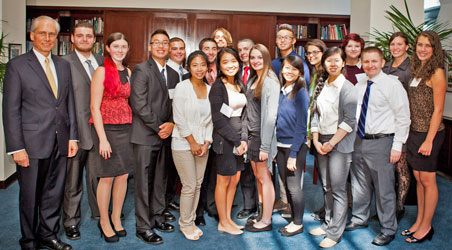
The members of John Jay’s inaugural class in CUNY’s Macaulay Honors College were feted September 17 in the office of President Jeremy Travis. Prospective Macaulay students at John Jay are chosen from a highly competitive field of applicants who demonstrate exceptional academic skills. They receive a full range of financial benefits, including: full undergraduate tuition scholarship for four years of study for New York State residents, a laptop computer, $7,500 to pursue global research, service and internships, and unique study-abroad opportunities. Dynamic faculty mentoring, spirited intellectual community and individual academic advisement are hallmarks of the Macaulay experience at John Jay. “The dedication necessary for success as a Macaulay Honors College student mirrors the passion instilled in John Jay College students to become fierce advocates for justice,” said President Jeremy Travis, who is seen here with the pioneering Macaulay students.
_______________________________________________________________________________
Alumni Show Their Primary Colors
Three prominent John Jay alumni recently won their Democratic primary election bids for citywide and Brooklyn borough office, putting them in strong positions in the November general elections in the heavily Democratic city.
Manhattan Borough President Scott Stringer (BA ’86) defeated former Gov. Elliot Spitzer in a hard-fought primary for New York City Comptroller. Stringer previously served 13 years in the New York State Assembly, where he represented the Upper West Side.
Kenneth Thompson (BA ’89), a trial lawyer , former federal prosecutor and founding partner of Thompson Wigdor LLP, scored a surprising primary upset in the race for Brooklyn district attorney, defeating longtime incumbent Charles Hynes.
Running unopposed in the primary for Brooklyn borough president, former New York City police officer Eric Adams (BA ’98) won handily and faces only token opposition in the general election. Since 2004, Adams has represented the 20th Senatorial District in the New York State Senate.
_______________________________________________________________________________
Be a Hero to Our Heroes

The fifth annual Treats for Troops campaign is now underway through November 11, providing a singular opportunity for members of the John Jay community to provide material relief to students who are serving in the military in overseas war zones, as well as services to homeless veterans in the New York area.
The program is coordinated by the Office of Community Outreach and Service Learning, in conjunction with the John Jay Veterans Association. Volunteers are stationed at collection sites around the campus, seeking donations of toiletries and other sundries, baby wipes, anti-fungal creams, socks, non-aspirin pain relievers, food items, holiday candy, “gently used” magazines, books and videogames, and letters of support. Monetary donations are also encouraged to cover additional purchasing costs along with packaging and shipping.
“Treats for Troops has become an integral part of the program here at the Office of Community Outreach,” said the office’s director, Declan Walsh. “We mark the fall semester with this, and the entire college community knows it’s coming and gets involved.”
Last year, Treats for Troops distributed 110 35-pound boxes to John Jay students. For donation and volunteer information, contact the Office of Community Outreach and Service Learning at 646-557-4820 or e-mail dwalsh@jjay.cuny.edu.
To make a donation online, click here and write “Treats for Troops” in the comment section.
_______________________________________________________________________________
Rave Reviews for Death-Penalty Book
 Professor Evan Mandery (left), Chair of the Department of Criminal Justice, has been reaping glowing reviews for his newest book, A Wild Justice: The Death and Resurrection of Capital Punishment in America, in which he tells the story of America’s ambivalent relationship with the death penalty. Professor Evan Mandery (left), Chair of the Department of Criminal Justice, has been reaping glowing reviews for his newest book, A Wild Justice: The Death and Resurrection of Capital Punishment in America, in which he tells the story of America’s ambivalent relationship with the death penalty.
The book, published by W.W. Norton, tells the behind-the-scenes story of two landmark Supreme Court decisions from the 1970s. In 1972, a divided Supreme Court struck down Georgia’s death penalty law in Furman v. Georgia, a decision that led casual observers to believe that capital punishment in the United States had ended. However, states responded with a groundswell of support for the death penalty, and in 1976 the Court reauthorized capital punishment in Gregg v. Georgia.
The New York Times Book Review said of A Wild Justice: “Explaining Furman and its implications can be tricky, but Evan Mandery…has done both with remarkable ease. Mandery knows how to tell a story, and he’s done some terrific research.” Publishers Weekly called Mandery “a gifted writer” and hailed the book as “a thriller” and an “intellectual page-turner,” while Kirkus praised the book as “outstanding every respect” and the Library Journal called it a “tour de force.”
Mandery, a former capital litigator, is the author of 20 law review articles on the subject and a textbook that is currently in its second edition. He was recently interviewed by U.S. News & World Report about his book. Click here to read it.
_______________________________________________________________________________
FACULTY & STAFF NOTES
On Board
Charles Davidson has been named as the new Director of the Center for the Advancement of Teaching. An attorney who formerly worked for the U.S. Department of Justice, Davidson was an assistant professor of international law at the American University in Cairo before coming to John Jay. He has worked on a wide variety of education reform projects in a dozen countries, primarily in the Middle East and the former Soviet Union.
The Printed Page
Raúl Rubio’s (Foreign Languages and Literatures) newest book La Habana: Cartografías Culturales, was published in July by the Aduana Vieja press of Spain. The book examines the worldwide fascination with Cuba and things Cuban during the last century, and provides a cutting-edge approach to the intersections among Cuban politics, ideology, national identity and artistic production, both on and off the island.
Katie Gentile (Counseling/Gender Studies) recently published two journal articles. One, “Biopolitics, Trauma and the Public Fetus: An Analysis of Preconception Care,” appears in the journal Subjectivity. The second “Bearing the Cultural in Order to Engage in a Process of Witnessing,” was published in Psychoanalytic Psychology.
Grantsmanship
Jessica Gordon-Nembhard (Africana Studies) has received a grant of $225,164 from the U.S. Department of Education to support the Ronald E. McNair Post-Baccalaureate Achievement Program.
Daryl Wout (Psychology) has been awarded $266,343 from the National Science Foundation for his research “Creating a Diverse Society That Works: Investigating the Role of Social Identity in Interracial Interactions.”
Stephen Handelman (Center on Media, Crime and Justice) received a $174,508 grant from the Jacob and Valeria Langeloth Foundation for a study of “Media, Correctional Health Care and the Affordable Care Act.”
Kimberly Helmer (English), a Scholar-in-Residence with the Center for the Advancement of Teaching, received a$3,990 PSC-CUNY Research Award to support her project “The Downtown School: An Ethnographic Study of Spanish Heritage-Language Learners in a Borderlands Charter High School.”
Recognition
Maria Volpe (Sociology/Dispute Resolution Center) received the 2013 Peace Award from the organization ATOP/Meaningfulworld. The award, presented on September 21 — the United Nations International Day of Peace — recognizes those who “create peace in local and global communities.”
|

